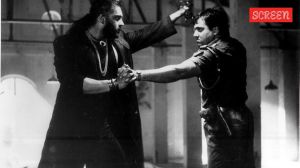Govt versus EC: high on rhetoric and low on fact
The Government claims that it’s not contesting the Election Commission’s authority to delay polls in Gujarat. And that it’s t...

The Government claims that it’s not contesting the Election Commission’s authority to delay polls in Gujarat. And that it’s the EC’s suggestion of President’s Rule in the state after October 6 which has prompted it to approach the Supreme Court. The Government’s objection—reiterated by Deputy Prime Minister L K Advani today—flies in the face of at least two precedents in the last decade.
And, ironically, in both these cases, the reasons for invoking President’s Rule were far less pressing than in Gujarat.
During the Bihar Assembly election of 1995, the Centre imposed President’s Rule in the state for nine days simply because the EC had postponed the poll date in some constituencies following law and order problems.
|
On J-K they agree: no delay
|
||
|
The EC has no intention to postpone the elections in Jammu & Kashmir…It is ready to hold the polls in four phases |
The EC could not, on account of those constituencies, constitute the new House before the expiration of the term of the outgoing House. It was only after the constitution of the new House that President’s Rule was lifted and Laloo Yadav sworn in again as Chief Minister.
Earlier, there was a brief spell of President’s Rule in Tripura in 1993 because the EC had postponed the poll in the entire state following violence in the course of the election process. Again, the cause of the President’s Rule was that the postponed poll date went beyond the term of the outgoing Assembly.
Significantly, in both those instances, the Centre invoked Article 356 on its own even though there is no express requirement anywhere in the Constitution that the new House has to be constituted before the expiration of the term of the outgoing Assembly.
But in the case of Gujarat, the EC thought it fit to suggest President’s Rule from October 6 because the postponement of election beyond that date does violate a Constitutional provision, Article 174(1), which lays down that the gap between two assembly sessions should not exceed six months.
Incidentally, both the EC and the Government agree that this six-month rule applies even in the case of a dissolved House, as in Gujarat. It’s a different matter that the BJP’s Rajnath Singh Government in Uttar Pradesh—represented by Soli Sorabjee and Harish Salve—argued the exact opposite in the Supreme Court last year.
Thus, from the viewpoint of the Constitution, the need for imposing President’s Rule in Gujarat on October 6 is greater than it was in the case of Bihar and Tripura.
The Centre, however, has taken umbrage to the very mention of Article 356 by the EC in its 40-page order on August 16 ruling that the situation in Gujarat was not conducive to hold free and fair elections by October 6.
The proposed Presidential Reference under Article 143 seems to have a weak foundation as all that the EC said is that ‘‘Article 174 must yield to Article 324 in the interest of genuine democracy and purity of elections.’’
As Article 324 casts a responsibility on it to hold free and fair elections, the EC said: ‘‘The non-observance of the provisions of Article 174(1) … would mean that the Government of the State cannot be carried on in accordance with the provisions of the Constitution within the meaning of Article 356 and the President would then step in.’’




- 01
- 02
- 03
- 04
- 05



























